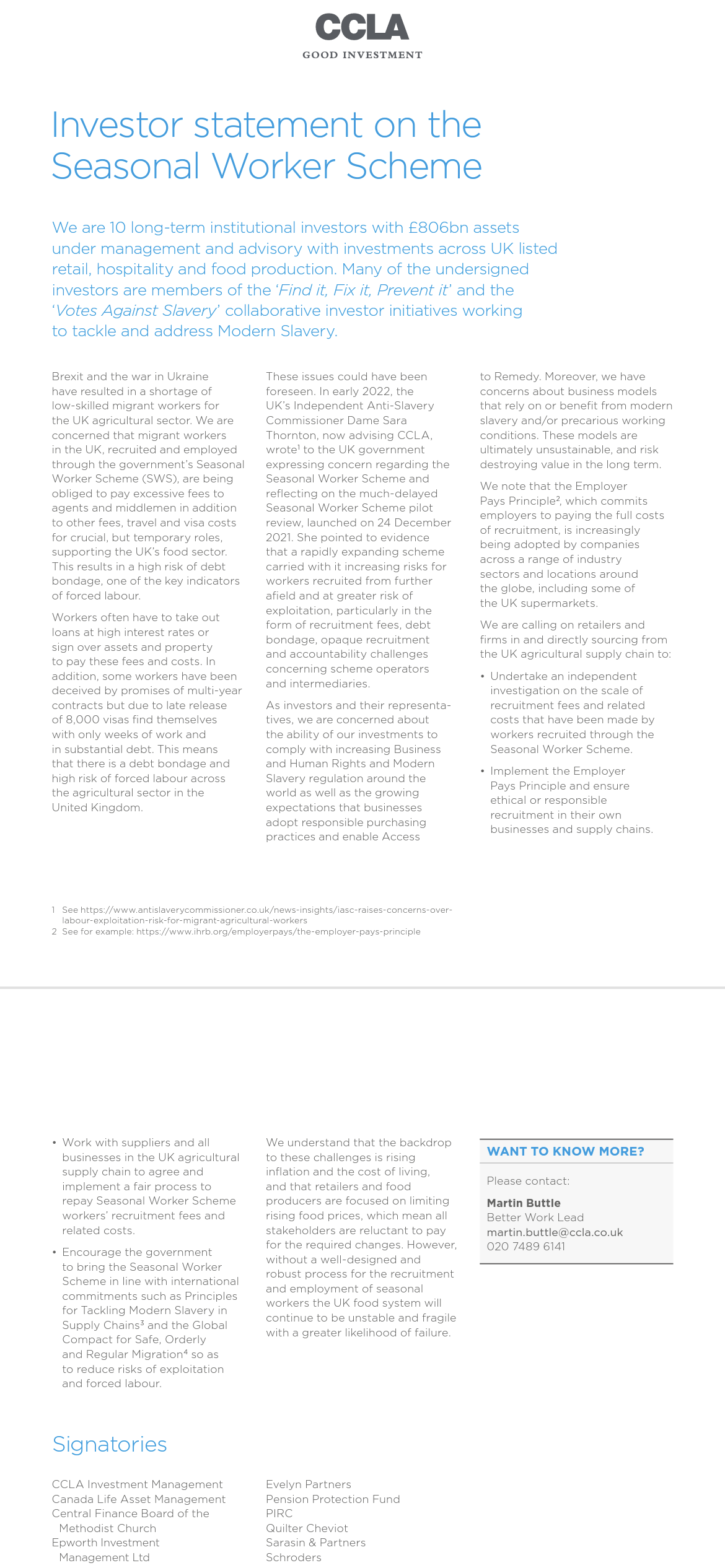19th Dec 2022: Investor statement on forced labour risks in the UK Seasonal Worker Scheme
The CCLA Good Investment released an investor statement on forced labour risks in the UK Seasonal Worker Scheme.
We are 10 long-term institutional investors with £806 bn assets under management and advisory with investments across UK listed retail, hospitality and food production.
Original article: CCLA Good Investment

Many of the undersigned investors are members of the ‘Find it, Fix it, Prevent it’ and the ‘Votes Against Slavery’ collaborative investor initiatives working to tackle and address Modern Slavery.
Brexit and the war in Ukraine have resulted in a shortage of low-skilled migrant workers for the UK agricultural sector. We are concerned that migrant workers in the UK, recruited and employed through the government’s Seasonal Worker Scheme (SWS), are being obliged to pay excessive fees to agents and middlemen in addition to other fees, travel and visa costs for crucial, but temporary roles, supporting the UK’s food sector. This results in a high risk of debt bondage, one of the key indicators of forced labour.
Workers often have to take out loans at high interest rates or sign over assets and property to pay these fees and costs. In addition, some workers have been deceived by promises of multi-year contracts but due to late release of 8,000 visas find themselves with only weeks of work and in substantial debt. This means that there is a debt bondage and high risk of forced labour across the agricultural sector in the United Kingdom.
These issues could have been foreseen. In early 2022, the UK’s Independent Anti-Slavery Commissioner Dame Sara Thornton, now advising CCLA, wrote1 to the UK government expressing concern regarding the Seasonal Worker Scheme and reflecting on the much-delayed Seasonal Worker Scheme pilot review, launched on 24 December 2021. She pointed to evidence that a rapidly expanding scheme carried with it increasing risks for workers recruited from further afield and at greater risk of exploitation, particularly in the form of recruitment fees, debt bondage, opaque recruitment and accountability challenges concerning scheme operators and intermediaries.
As investors and their representatives, we are concerned about the ability of our investments to comply with increasing Business and Human Rights and Modern Slavery regulation around the world as well as the growing expectations that businesses adopt responsible purchasing practices and enable Access to Remedy. Moreover, we have concerns about business models that rely on or benefit from modern slavery and/or precarious working conditions. These models are ultimately unsustainable, and risk destroying value in the long term.
We note that the Employer Pays Principle2, which commits employers to paying the full costs of recruitment, is increasingly being adopted by companies across a range of industry sectors and locations around the globe, including some of the UK supermarkets.
We are calling on retailers and firms in and directly sourcing from the UK agricultural supply chain to:
• Undertake an independent investigation on the scale of recruitment fees and related costs that have been made by workers recruited through the Seasonal Worker Scheme.
• Implement the Employer Pays Principle and ensure ethical or responsible recruitment in their own businesses and supply chains.
• Work with suppliers and all businesses in the UK agricultural supply chain to agree and implement a fair process to repay Seasonal Worker Scheme workers’ recruitment fees and related costs.
• Encourage the government to bring the Seasonal Worker Scheme in line with international commitments such as Principles for Tackling Modern Slavery in Supply Chains3 and the Global Compact for Safe, Orderly and Regular Migration4 so as to reduce risks of exploitation and forced labour.
We understand that the backdrop to these challenges is rising inflation and the cost of living, and that retailers and food producers are focused on limiting rising food prices, which mean all stakeholders are reluctant to pay for the required changes. However, without a well-designed and robust process for the recruitment and employment of seasonal workers the UK food system will continue to be unstable and fragile with a greater likelihood of failure.
Signatories
- CCLA Investment Management
- Canada Life Asset Management
- Central Finance Board of the Methodist Church
- Epworth Investment Management Ltd
- Evelyn Partners Pension Protection Fund
- PIRC
- Quilter Cheviot
- Sarasin & Partners Schroders
See also: 27th July 2023: UK’s Seasonal Worker Scheme Raising Human Rights Concerns in the Food Sector.
See also: BHRRC Blog Series: UK Seasonal Worker Scheme Endangers Vulnerable Foreign Workers.


